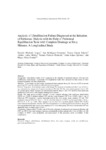Mostrar o rexistro simple do ítem
Analysis of ultrafiltration failure diagnosed at the initiation of peritoneal dialysis with the help of peritoneal equilibration tests with complete drainage at sixty minutes: a longitudinal study
| dc.contributor.author | Machado Lopes, Daniela | |
| dc.contributor.author | García Falcón, María Teresa | |
| dc.contributor.author | Rodríguez Carmona, Ana | |
| dc.contributor.author | López-Muñiz, Andrés | |
| dc.contributor.author | Ferreiro-Hermida, Tamara | |
| dc.contributor.author | López-Iglesias, Antía | |
| dc.contributor.author | Pérez-Fontán, Miguel | |
| dc.date.accessioned | 2021-06-22T10:05:19Z | |
| dc.date.available | 2021-06-22T10:05:19Z | |
| dc.date.issued | 2016-01-13 | |
| dc.identifier.citation | Machado Lopes D, Rodríguez-Carmona A, García Falcón T, López Muñiz A, Ferreiro Hermida T, López Iglesias A, et al. Analysis of ultrafiltration failure diagnosed at the initiation of peritoneal dialysis with the help of peritoneal equilibration tests with complete drainage at sixty minutes: a longitudinal study. Perit Dial Int. 2016;36(4):442-7 | es_ES |
| dc.identifier.issn | 0896-8608 | |
| dc.identifier.uri | http://hdl.handle.net/2183/28120 | |
| dc.description.abstract | [Abstract] Background: Ultrafiltration failure (UFF) diagnosed at the initiation of peritoneal dialysis (PD) has been insufficiently characterized. In particular, few longitudinal studies have analyzed the time course of water transport in patients with this complication. ♦ Objective: To investigate the time course of peritoneal water transport during the first year on PD in patients presenting UFF since the initiation of this therapy (study group). ♦ Method: Prospective, observational, single-center design. We analyzed, at baseline and after 1 year of follow-up, peritoneal water transport in 19 patients incident on PD with UFF. We used incident patients without UFF as a control group. Water transport was characterized with the help of 3.86/4.25% dextrose-based peritoneal equilibration tests (PETs) with complete drainage at 60 minutes. ♦ Results: The study group revealed a disorder of water transport affecting both small-pore ultrafiltration (SPUF) (p = 0.054 vs incident without UFF) and free water transport (FWT) (p = 0.001). After 1 year of follow-up, FWT displayed a general increasing trend in the study group (mean variation 48.9 mL, 95% confidence interval [CI] 15.5, 82.2, p = 0.012), while the behavior of SPUF was less predictable (-4.8 mL, 95% CI -61.4, 71.1, p = 0.85). These changes were not observed in incident patients without UFF. Neither initial clinical characteristics, baseline PET-derived parameters, or suffering peritoneal infections during the first year predicted the time course of the capacity of UF in the study group. Recovery from incident UFF was apparently linked to improvement of SPUF. ♦ Conclusions: Patients with UFF at the start of PD suffer a disorder of peritoneal water transport affecting both FWT and SPUF. Free water transport increases systematically in these patients after 1 year of follow-up. The evolution of SPUF is less predictable, and improvement of this parameter marks reversibility of this complication. | es_ES |
| dc.language.iso | eng | es_ES |
| dc.publisher | SAGE | es_ES |
| dc.relation.uri | https://doi.org/10.3747%2Fpdi.2015.00163 | es_ES |
| dc.subject | Peritoneal dialysis | es_ES |
| dc.subject | Free water transport | es_ES |
| dc.subject | Peritoneal equilibration test | es_ES |
| dc.subject | Small pore ultrafiltration | es_ES |
| dc.subject | Ultrafiltration | es_ES |
| dc.subject | Ultrafiltration failure | es_ES |
| dc.title | Analysis of ultrafiltration failure diagnosed at the initiation of peritoneal dialysis with the help of peritoneal equilibration tests with complete drainage at sixty minutes: a longitudinal study | es_ES |
| dc.type | info:eu-repo/semantics/article | es_ES |
| dc.rights.access | info:eu-repo/semantics/openAccess | es_ES |
| UDC.journalTitle | Periotneal Dialysis International | es_ES |
| UDC.volume | 36 | es_ES |
| UDC.issue | 4 | es_ES |
| UDC.startPage | 442 | es_ES |
| UDC.endPage | 447 | es_ES |
Ficheiros no ítem
Este ítem aparece na(s) seguinte(s) colección(s)
-
GI-FENM - Artigos [106]






